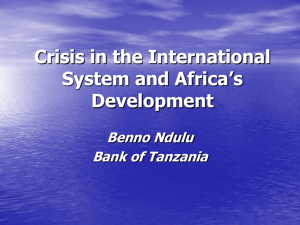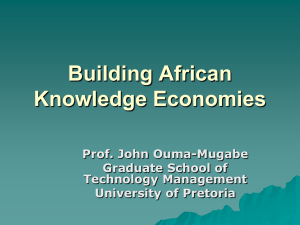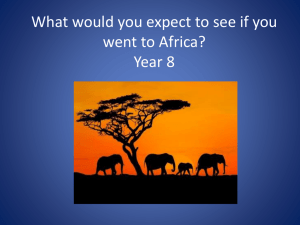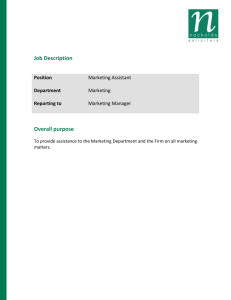Africa
advertisement
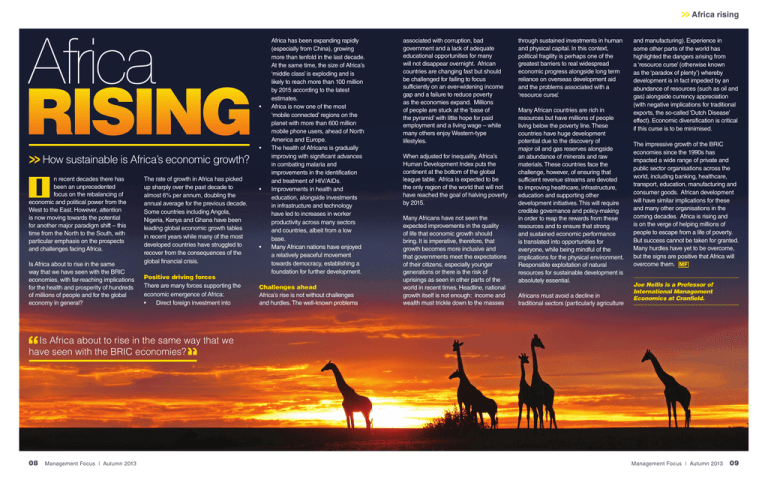
>> Africa rising Africa rising >> How sustainable is Africa’s economic growth? n recent decades there has been an unprecedented focus on the rebalancing of economic and political power from the West to the East. However, attention is now moving towards the potential for another major paradigm shift – this time from the North to the South, with particular emphasis on the prospects and challenges facing Africa. Is Africa about to rise in the same way that we have seen with the BRIC economies, with far-reaching implications for the health and prosperity of hundreds of millions of people and for the global economy in general? The rate of growth in Africa has picked up sharply over the past decade to almost 6% per annum, doubling the annual average for the previous decade. Some countries including Angola, Nigeria, Kenya and Ghana have been leading global economic growth tables in recent years while many of the most developed countries have struggled to recover from the consequences of the global financial crisis. Positive driving forces There are many forces supporting the economic emergence of Africa: • Direct foreign investment into • • • • Africa has been expanding rapidly (especially from China), growing more than tenfold in the last decade. At the same time, the size of Africa’s ‘middle class’ is exploding and is likely to reach more than 100 million by 2015 according to the latest estimates. Africa is now one of the most ‘mobile connected’ regions on the planet with more than 600 million mobile phone users, ahead of North America and Europe. The health of Africans is gradually improving with significant advances in combating malaria and improvements in the identification and treatment of HIV/AIDs. Improvements in health and education, alongside investments in infrastructure and technology have led to increases in worker productivity across many sectors and countries, albeit from a low base. Many African nations have enjoyed a relatively peaceful movement towards democracy, establishing a foundation for further development. Challenges ahead Africa’s rise is not without challenges and hurdles. The well-known problems associated with corruption, bad government and a lack of adequate educational opportunities for many will not disappear overnight. African countries are changing fast but should be challenged for failing to focus sufficiently on an ever-widening income gap and a failure to reduce poverty as the economies expand. Millions of people are stuck at the ‘base of the pyramid’ with little hope for paid employment and a living wage – while many others enjoy Western-type lifestyles. When adjusted for inequality, Africa’s Human Development Index puts the continent at the bottom of the global league table. Africa is expected to be the only region of the world that will not have reached the goal of halving poverty by 2015. Many Africans have not seen the expected improvements in the quality of life that economic growth should bring. It is imperative, therefore, that growth becomes more inclusive and that governments meet the expectations of their citizens, especially younger generations or there is the risk of uprisings as seen in other parts of the world in recent times. Headline, national growth itself is not enough: income and wealth must trickle down to the masses through sustained investments in human and physical capital. In this context, political fragility is perhaps one of the greatest barriers to real widespread economic progress alongside long term reliance on overseas development aid and the problems associated with a ‘resource curse’. Many African countries are rich in resources but have millions of people living below the poverty line. These countries have huge development potential due to the discovery of major oil and gas reserves alongside an abundance of minerals and raw materials. These countries face the challenge, however, of ensuring that sufficient revenue streams are devoted to improving healthcare, infrastructure, education and supporting other development initiatives. This will require credible governance and policy-making in order to reap the rewards from these resources and to ensure that strong and sustained economic performance is translated into opportunities for everyone, while being mindful of the implications for the physical environment. Responsible exploitation of natural resources for sustainable development is absolutely essential. Africans must avoid a decline in traditional sectors (particularly agriculture and manufacturing). Experience in some other parts of the world has highlighted the dangers arising from a ‘resource curse’ (otherwise known as the ‘paradox of plenty’) whereby development is in fact impeded by an abundance of resources (such as oil and gas) alongside currency appreciation (with negative implications for traditional exports, the so-called ‘Dutch Disease’ effect). Economic diversification is critical if this curse is to be minimised. The impressive growth of the BRIC economies since the 1990s has impacted a wide range of private and public sector organisations across the world, including banking, healthcare, transport, education, manufacturing and consumer goods. African development will have similar implications for these and many other organisations in the coming decades. Africa is rising and is on the verge of helping millions of people to escape from a life of poverty. But success cannot be taken for granted. Many hurdles have yet to be overcome, but the signs are positive that Africa will overcome them. MF Joe Nellis is a Professor of International Management Economics at Cranfield. Is Africa about to rise in the same way that we have seen with the BRIC economies? 08 Management Focus | Autumn 2013 Management Focus | Autumn 2013 09

